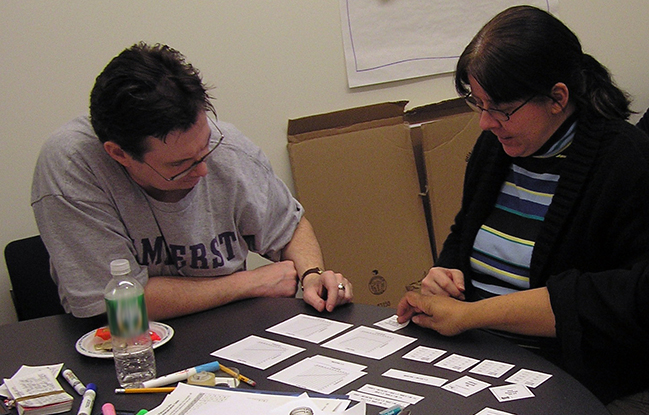Curriculum Used as a Tool for Professional Development
The goal of TIAN is to develop, pilot, and field test an effective and sustainable in-service professional development model for teachers in a variety of adult basic education (ABE) and out-of-school youth program settings. The audiences for the model are the teachers and programs across the country who work with the two and a half million adults who are seeking the knowledge, skills, and credentials that will enable them to have the access to information, voice, independence of action, and learning skills to be more effective as workers, parents, and community members (Stein, 1995). This model for professional development aligns with two reform components in the adult basic education system—standards and curriculum—and addresses professional development as an essential component of comprehensive reform for adult basic education instruction.

Following in the tradition of K-12 reform mathematics curricula (e.g., Investigations in Number, Data, and SpaceTM ; Connected Mathematics; and the Interactive Mathematics Program), Project TIAN focused on increasing the content knowledge and classroom instructional skills of adult basic education mathematics teachers by designing, testing, and disseminating a professional development model that involves teachers in learning how to bring their mathematics content standards to life using a new and innovative adult mathematics curriculum. The model focused on mathematics and numeracy standards that are research-based, developmental in nature, and written specifically for adult students, and will use the Extending Mathematical Power (EMPower™) curriculum as a primary resource. A facilitator-training component will strengthen the infrastructure of adult basic education nationally.
The professional development model includes the following elements:
- Three, two-day immersion institutes for teams of teachers from adult education programs. These institutes are supported at the state level and will involve teachers in 1) learning about math content (in data analysis at Institute I and algebra at Institute II) and sound instructional techniques by participating in math lessons; and 2) planning for ongoing development, implementation, and documentation of, as well as reflection on, lessons in which teacher and students investigate data analysis and algebra.
- Teacher implementation and documentation of classroom investigations on algebraic reasoning and data analysis in the eight months following the initial institute. These investigations will be guided by the EMPower™ curriculum.
- Periodic regional meetings to share experiences and examine and evaluate student work.
- A culminating two-day meeting in each state focusing on how teachers can use the expertise they have gained in the course of the year’s activities to develop instruction for all the strands addressed in their state math standards.
- The training of facilitators will engage teams of state-level adult education professional developers working with participating mathematics teachers. The mathematics teachers will serve as participant co-facilitators in the model for one cycle and as facilitators (with project support and technical assistance) in a second cycle.
Is your state or program interested in on-site or online math professional development for your adult education staff?
The Adult Numeracy Center at TERC is here to help! We can provide customized professional development on many different math content topics and teaching strategies. Contact us here.
